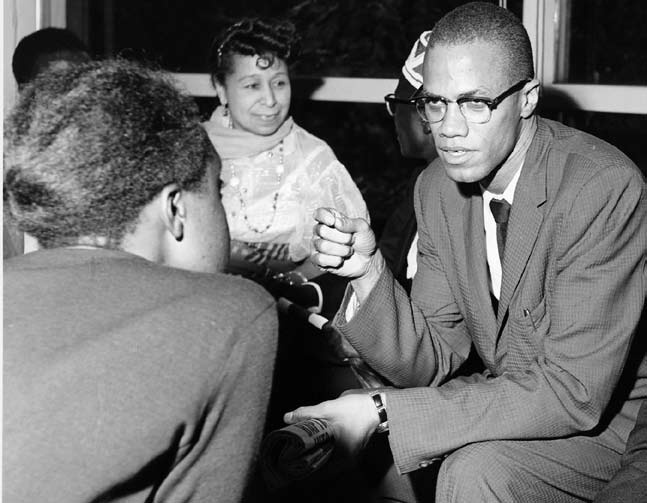
Chanel Enow chose Malcom X to write about for Black History Month 2025. This year, the theme is 'Standing Firm in Power and Pride'. Read her blog post below.
I had already liked the idea of Malcolm X before I really knew anything about him.
And that was all I knew - the idea. A sort of ‘militant black supremacist’, the ‘revolutionary’ opposition to Martin Luther King. I use these terms in quotes because they feel like an oversimplification. We all knew Martin Luther King. My brothers, 8 and 12, children of the 2010s, knew Martin Luther King. He’s saintly. When I was making my way through Malcolm X’s autobiography, I ended up asking one of them, ‘’Do you know who Malcolm X is?’’
He had replied ‘’The X-men villain?’’
‘’That’s Magneto’’, I responded. ‘’Or Professor X?’’. That made me upset.
To the public, and to my surprise, Malcolm X seems to be Magneto-like. This sort of comic book anti-hero archetype follows him: "he has a valid idea, but goes about it in the wrong way". He was derogatorily referred to as the ‘angriest black man in America.’
In the Marvel universe, Magneto is both a Jewish Holocaust survivor and a super-powered ‘mutant’. His characterisation varies, but generally, he has faced so much discrimination that he becomes the same extreme in the opposite direction, inciting violence against humans as a necessary means to an end.
After hearing directly from Malcolm X’s words, I feel the need to provide some vindication.
Racism very much directed his life. His mother was a product of a white man raping a black woman; white supremacists lynched his father. He and his siblings were in and out of the care system due to the demonisation of single black motherhood. And in the beginning, before doing a stint in prison that he credits with changing his life. He lived a life of somewhat petty crime as a result.
What Malcolm X did was highlight structural inequality at a time when everyone believed it was incredibly individual. The idea that someone could only be a criminal/poor/homeless because of their own actions. This was simple. It was limiting. American society was built on a denial of black and Native American humanity, violence and racism. It was imported white-washed history, etc.
Many of the black people in America were unaware of the extent of this history. That’s already violent. To Malcolm X, it’s a crime we don’t consider it so. He opened up such binary thinking. Violence doesn’t have to be directly intimate or confrontational, involving a gun or a knife. And no matter what, the white man would have black people believe reform hasn’t gone far enough.
What I find really interesting about Malcolm X’s opinion of MLK is that it begins unfriendly but actually ends up quite sympathetic. In fact, they both made ideological concessions towards the end of their lives that actually brought them closer together in belief. A lot of Malcolm X’s early beliefs are unfortunately wound up in Nation of Islam politics. He rejects this later in life after connecting with genuine Islam. He acknowledges the value of non-racist white people who want to be part of the anti-racist cause.
Interestingly, throughout the book, he refers to an entity of ‘the white man’ as the perpetrator. There are no calls for violence against specific individuals. He’s against wanton violence. When he was a minister for the Nation, he preached and helped organise peaceful marches against police precincts that had unlawfully imprisoned black people. Yet the media helped portray him as violent, taking his words out of context. So I’ll leave you with my favourite quote of his:
It takes no one to stir up the sociological dynamite that stems from the unemployment, bad housing, and inferior education already in the ghettoes. This explosively criminal condition has existed for so long, it needs no fuse.
Image used: File: Malcolm X in discussion.jpg. (2025, July 10). Wikimedia Commons. Retrieved October 2, 2025, from https://commons.wikimedia.org/w/index.php?title=File:Malcolm_X_in_discussion.jpg&oldid=1055467382.